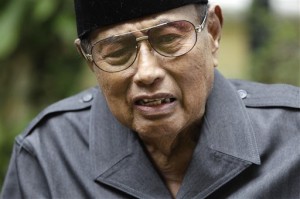US steers clear of Sabah issue

Sultan of Sulu Jamalul Kiram talks to reporters during a news conference in Alabang, south of Manila, Philippines on Sunday, Feb. 17, 2013. His followers who crossed to the Malaysian state of Sabah this month will not leave and are reclaiming the area as their ancestral territory, the sultan said Sunday, Feb. 17, 2013, amid a tense standoff. AP PHOTO/AARON FAVILA
ZAMBOANGA CITY, Philippines—Despite the potential threat to the peace process in Mindanao that it supports, the United States is staying away from the Sabah crisis, as it is a problem that only the leaders of the Philippines and Malaysia can deal with.
Malacañang itself has refused to step in to break a standoff between Malaysian security forces and a group of armed followers of the sultan of Sulu in Tanduao village in the coastal town of Lahad Datu in Sabah.
The followers of Sulu Sultan Jamalul Kiram III crossed to Sabah on February 9 in what they called a journey back to their homeland.
Malaysian police, military and naval forces have encircled the armed group led by Agbimuddin Kiram, a brother of the sultan. The security forces are waiting for orders to flush out Kiram and his followers and bring them in for deportation proceedings.
Speaking to reporters here on Wednesday, US Ambassador to the Philippines Harry Thomas said Manila and Kuala Lumpur should settle the issue.
“This is something, which is between the Philippine government and the government of Malaysia,” he said following the inauguration of a P13-million training center at the Philippine Public Safety College here.
Thomas said Washington believed that if the two governments would sit down and talk, the standoff could be resolved without bloodshed.
Manila and Kuala Lumpur have the ability “to work this out in a peaceful manner, according to International norms,” Thomas said.
In Ozamiz City, Moro Islamic Liberation Front (MILF) peace panel member Maulana Alonto said the timing of the Sabah “homecoming” of the so-called royal army of the Sultanate of Sulu and North Borneo was suspect.
“We are not questioning the validity of the Sulu sultan’s claim over Sabah. That is for the proper international bodies involved in mediation to determine,” he said, adding that the MILF’s concern was “the timing of the invasion of Sabah and the reason given for resorting to such an act by the people behind it.”
Former MILF spokesperson Eid Kabalu said he suspected the Sabah standoff was aimed at undermining the peace process and those behind it included Moro National Liberation Front leader Nur Misuari, who had publicly admitted that he resented the Framework Agreement on the Bangsamoro signed by the government and the MILF.
Alonto said it was sad that Jamalul was using the peace deal as pretext for his foray into Sabah. The peace process was being brokered by the Malaysian government.
“Ruminating on these developments, past and present, we cannot help but ask: ‘Why do Moros always allow themselves to be used as instruments by elements that are inherently inimical to their cause?’”Alonto said.
Earlier, MILF deputy information chief Khaled Musa brushed off Kiram’s allegations saying the group had reached out to them and made known its position about the Sulu sultanate and any others like it.
“We want to preserve it but we will not revive it,” Musa said.
“The sultanate is part of Moro history and heritage and it is one of the bases of the present Moro’s assertion of its right to self-determination,” he added.
Musa said the main reason for the MILF’s not reviving the Sabah claim was that the sultanate system divided the people into categories such as nobles, commoners, and slaves, almost like the Indian caste system.
“The only difference is that among Moros, slaves were at times given the chance to buy their freedom or were freed by benevolent nobles,” he said.
Alonto said “the infusion of several external factors” had made the issue of the Sulu sultan’s claim to Sabah more complicated.
“Now the plot has thickened. Foreign elements are being ‘invited’ to put their fingers (into) the pudding,” he added.
He suggested that the governments of the Philippines and Malaysia take up the issue “in the proper international forum for peaceful and amicable resolution.”